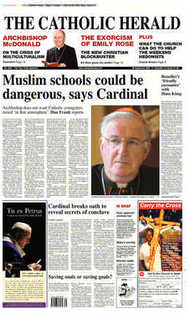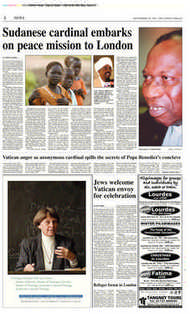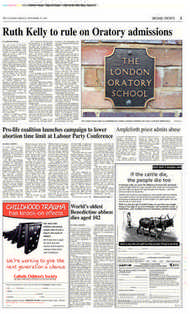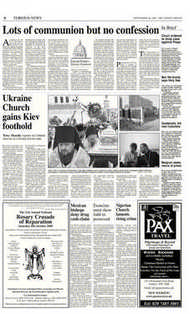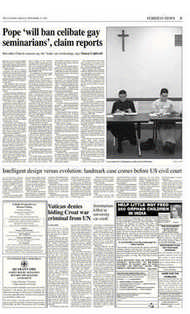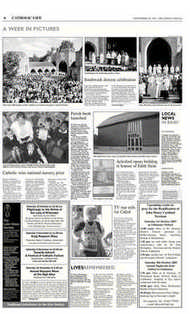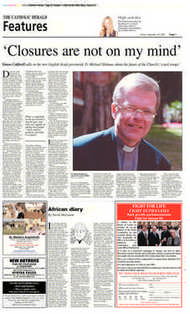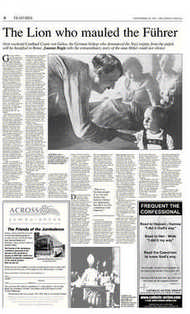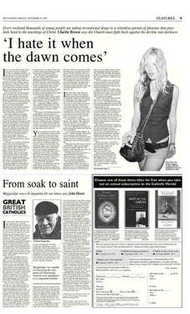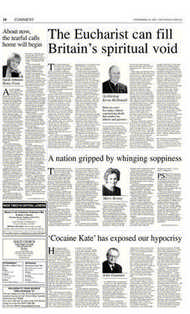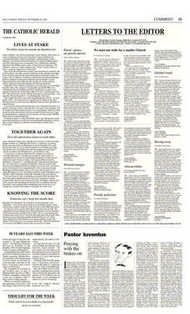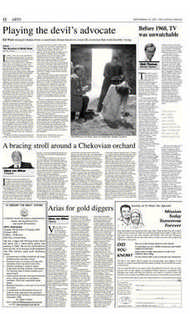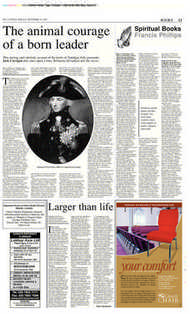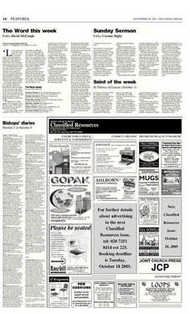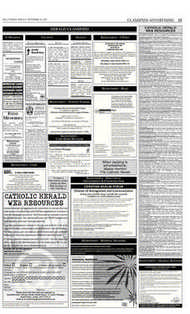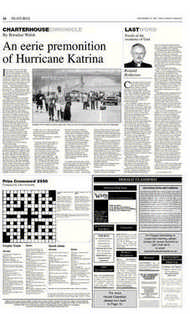Page 16, 30th September 2005
Page 16
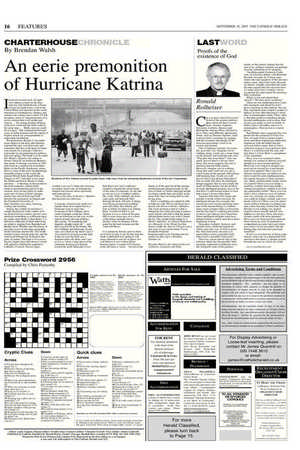
Report an error
Noticed an error on this page?If you've noticed an error in this article please click here to report it.
Tags
Share
Related articles
American Dioceses Blown Away By Hurricane
America Mourns Giant Of Post-war Church
Charterhouse Chronicle
You Get To Know Your Neighbours When Your Wife Is Laid Up
Meeting America's Rocket And Parmesan Evangelicals
Charterhouse
An eerie premonition of Hurricane Katrina
Ireceived several (well, all right, two) nattery e-mails in the days after my last Charterhouse column. I’d just got back from a visit to the United States and reported on the weird sensation of simultaneous vibrancy and sickness the country had evoked. I’d felt an uneasy sense of “precariousness, of a social contract that is all smoke and mirrors ... the strange feeling of being in the first world and the third world at the same time ... Blink, and you could be in Lagos”. The comparison between a city in north America and the capital of Nigeria struck my correspondents as impossibly far-fetched.
For prescience, though, I was much more shaken in the days after Katrina exposed the ugly cyst of poverty and corruption that lies at the heart of American society by a passage I read in a typescript we are preparing for publication next spring. The book is to be called The Monk’s Alphabet; the author is Jeremy Driscoll, an American Benedictine monk. Fr Jeremy was born in 1951 and raised in a small town in northern Idaho, in the Pacific Northwest, where there is some of the most breathtakingly beautiful scenery in the world. He entered Mount Saint Angel Abbey in Oregon in 1973 and after seven years the Abbot sent him to Rome to study patristics – ie theology in the second to the sixth centuries, a particularly creative and boisterous period in the scratchy story of our efforts to make some sort of sense of God’s designs. Jeremy has moved back and forth between his monastery in Oregon and the Pontifical University of Sant’Anselmo ever since, studying, writing and teaching.
Jeremy has written several heavyweight theological works, rather over my head I have to confess, but he’s now produced something in a different register, rather more Radio 2 than Radio 3, a delicious collection of short reflections on subjects ranging from Baghdad and Beethoven to Weather and Zacchaeus. It provides access to the inner geography of the Christian interior life. The monkscholar is there, but the poet too, and the wide-eyed Oregon boy in thrall to the glory of nature. The hope is (I’m crossing my fingers here) that Jeremy’s book will appeal to faithful but inquisitive Catholics (Catholic Herald types, wouldn’t you say?) while also drawing in readers more wary of institutional religion but curious about spirituality and monasticism.
This is the entry in Jeremy’s Alphabet that knocked me sideways: Louisiana. I heard in the midst of a regular daily news report that if a hurricane were to slam into Louisiana at New Orleans, thousands of people could die. There was no hurricane on the way, so this report seemed odd and arbitrary, like saying, “If something bad happens, people might die” – and then you just fill in the blanks, like New Orleans and hurricane. In any case, for a flash in my mind’s eye, I was raised for several seconds high in the air over the Gulf, say a hundred miles off shore; and I saw as if in a vision a large piece of the continent, looking at it directly toward the north. Basically it was land that I saw, but I could also somehow discern the actual shape of the state of Louisiana. As big and as vast as it was, it looked vulnerable, weak. Then suddenly the hurricane came and furiously blew through the land. All sorts of things were flying around and tumbling past each other. But nobody got hurt or killed, for there was nobody there. I could not tell if it was because it was a vision of the past, 400 or more years ago, or a vision of the future, perhaps not too distant, when we humans will be gone but the land remains and the wind still blows.
I’ve spoken to Jeremy and we think we’ll have to take it out. By the time the book is published next spring it will seem insensitive and out of place: few will believe it was written before Katrina struck. I wonder if Fr Jeremy really did have a vision – but not of the future or of the past but of that strange parallel present glimpsed only by the eyes of faith, in which, although people are being cruelly hurt and killed, at the same time, they are being held in safe, loving arms.
Here’s something you might be able to help me with. We’re still stuck for a decent sub-title to A Monk’s Alphabet. The usual nostrum is that if a title is intriguing but a little puzzling it needs a more prosaic sub-title so that the potential purchaser knows just what’s inside the tin. The current front-runner is A Monk’s Alphabet: Accidental Reflections of a Monastic in the World, but that doesn’t really fly, does it? I’ll give you a free copy if you can do better: I’m at brendanw@darton longman-todd.co.uk. Closing date for entries (as they say) is Monday, October 10.
Brendan Walsh is the editorial director of Darton, Longman and Todd
blog comments powered by Disqus


